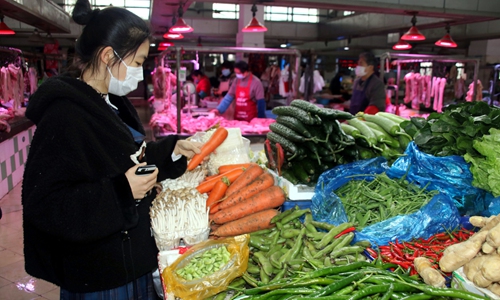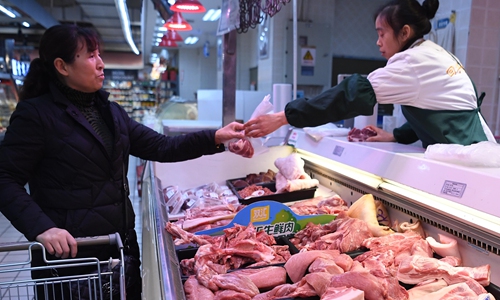
A woman selects vegetables in a market in Suzhou, East China's Jiangsu Province on Monday. As supplies of vegetables stabilize, prices are coming back to normal, according to the local government. Photo: IC
China's consumer price index (CPI), a main gauge of inflation, jumped 5.2 percent year-on-year in February amid extensive efforts to contain the coronavirus outbreak, but analysts forecast a declining trend along with the easing of the outbreak in the country.
The figure was 0.2 percentage points lower than January when the index skyrocketed to an eight-year high of 5.4 percent, said the National Bureau of Statistics (NBS) on Tuesday.
According to the NBS, February's gain was fueled by a surge in food prices. Pork prices rose 135.2 percent year-on-year, contributing a 3.19 percentage point increase to the CPI.
The food price rise was mainly due to transportation lockdowns across the country to contain the spread of the new coronavirus, while a delivery labor shortage added to costs, the NBS said.
Supplies were affected as some companies and markets delayed reopening and many consumers stockpiled food, it said.
Meanwhile, prices of non-daily necessities remained stable, with some even declining. In February, the price of gasoline slid 5.7 percent month-on-month and that of diesel dropped 6.2 percent.
The CPI figure in February was within expectation and the index will continue to drop as the outbreak has been increasingly come under control in China, Ming Ming, chief macro and fixed-income analyst at CITIC Securities, said in a note on Tuesday.
A research report from Bank of Communications predicted that the CPI will remain above 4 percent in the first half of this year due to carryover effects.
In February, weak industrial demand, delayed manufacturing as well as an international oil price slump sent China's producer price index (PPI), which measures the cost of goods at the factory gate, into a contraction.
The PPI was down 0.4 percent year-on-year in February, compared with a 0.1 percent rise in January, according to the NBS.
Huang Yanming, director of the research institute at Guotai Junan Securities, said during an online conference on Tuesday that amid economic challenges caused by the outbreak, it's anticipated that a new round of stimulus around the globe will be launched.
China's fiscal deficit ratio is expected to be raised to 3.5 percent, Huang said. He pointed to a V-shaped rebound in China's economy starting in the second quarter.

